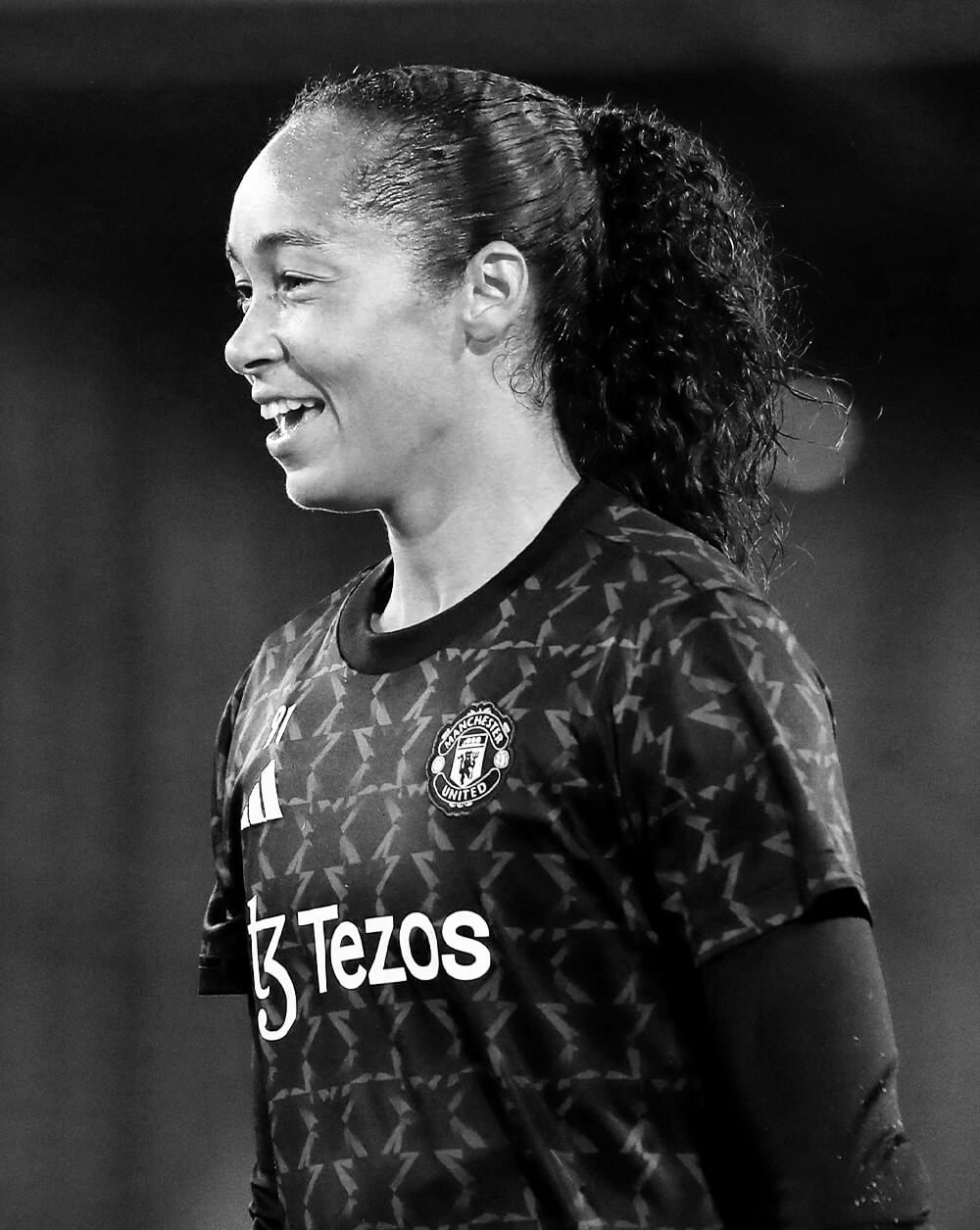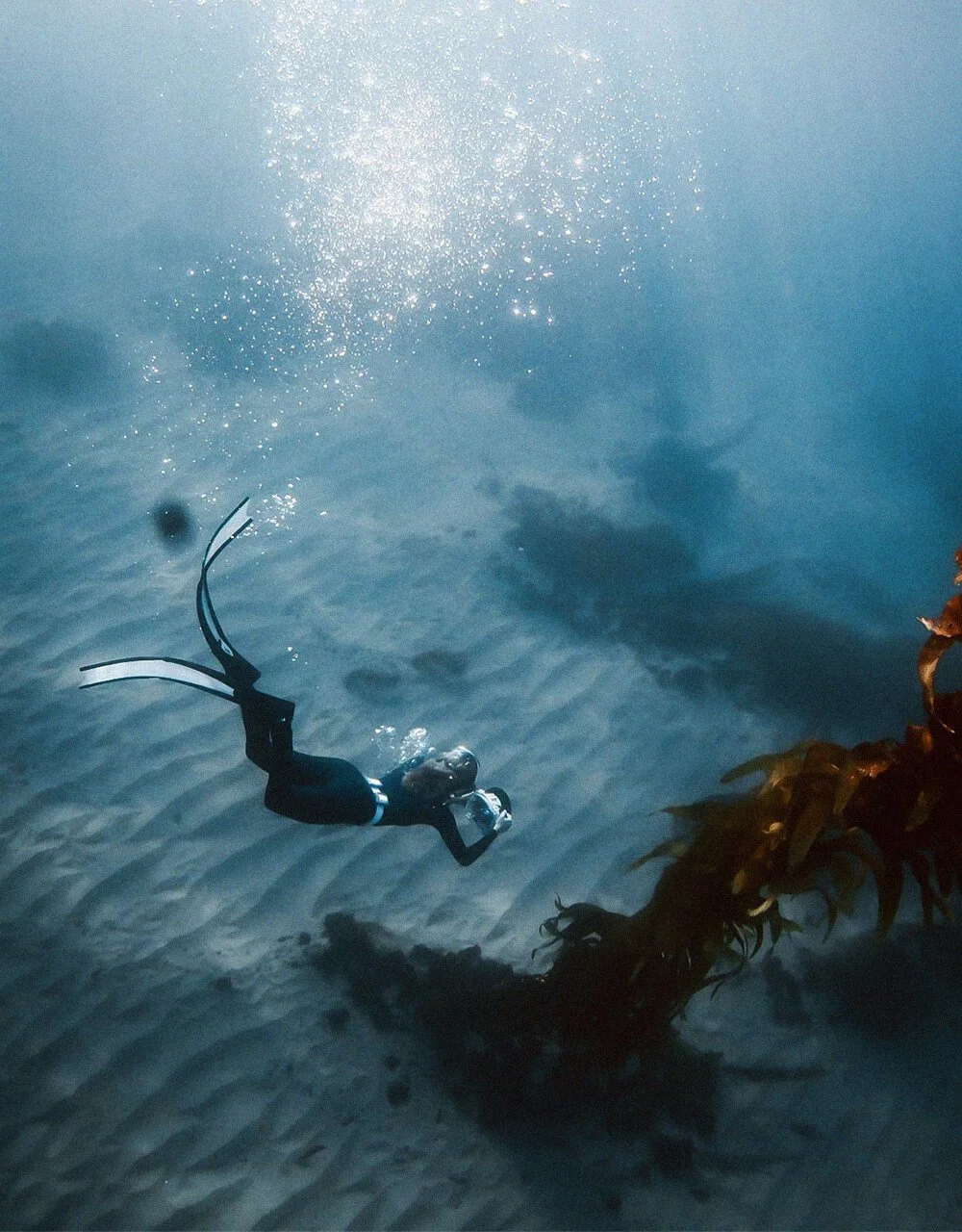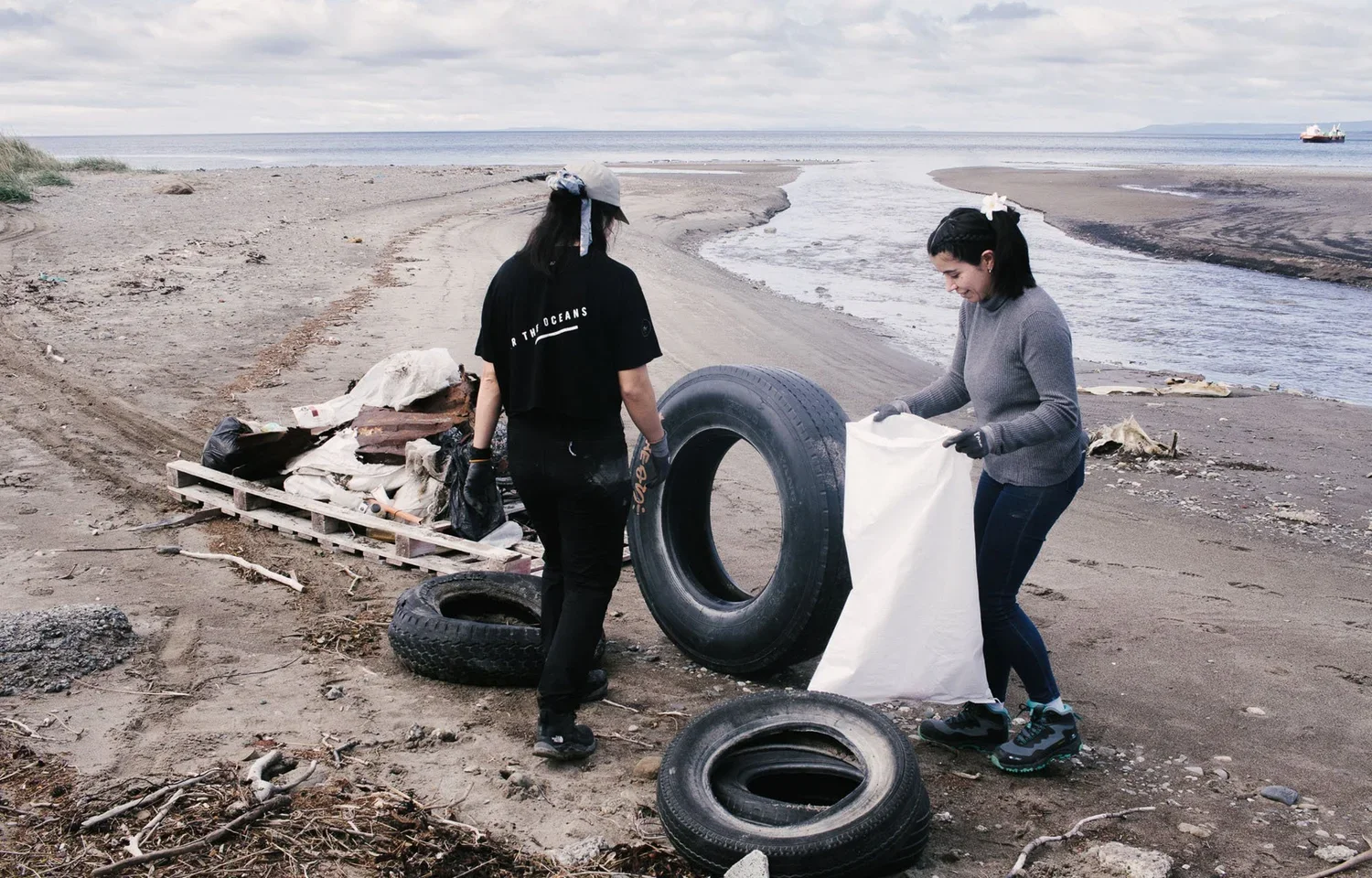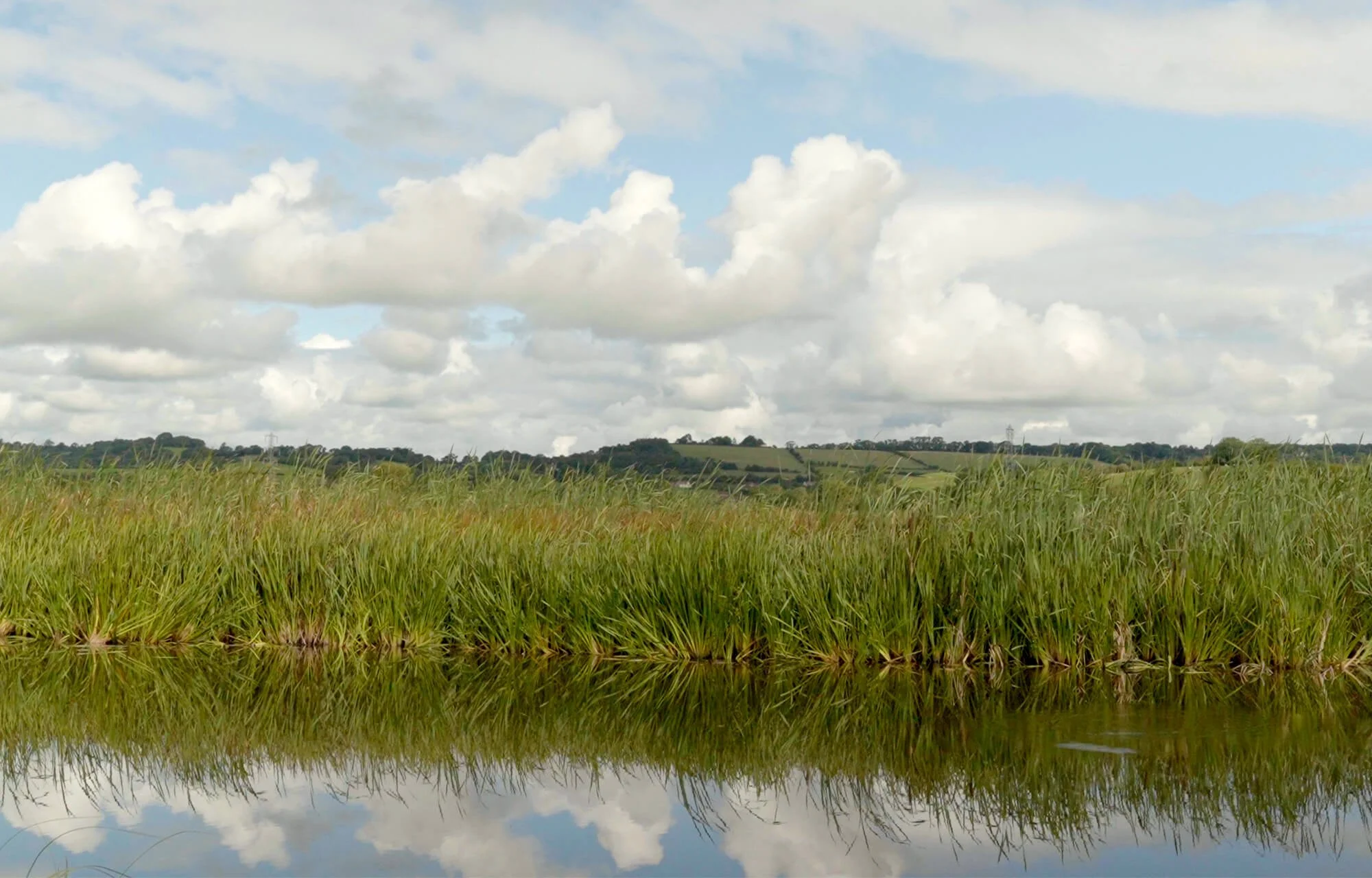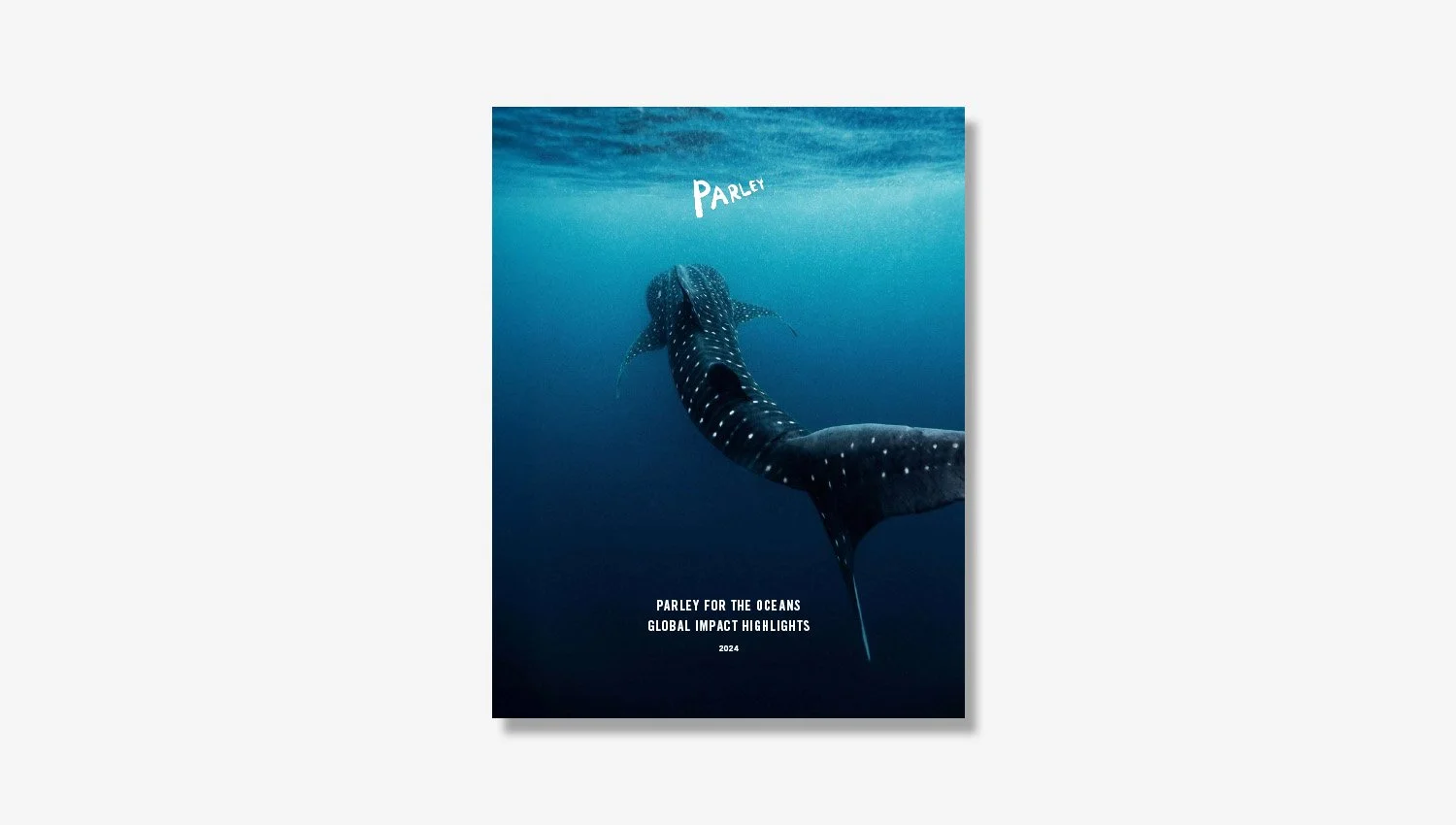Phallon Tullis-Joyce: The Marine Biologist Who’s Also Manchester United’s No1 Goalkeeper
We visited Manchester United’s training ground to talk to the women’s team’s shotstopper, who is as passionate about the ocean as she is soccer
It’s often said in soccer that to be a goalkeeper you need to be eccentric. It’s ultimately a lonely position, one that comes with intense pressure and responsibility. It’s the last line of defence, with your body very literally on the line. French philosopher Albert Camus famously played in goal until tuberculosis forced him to stop. “What I know most surely about morality and the duty of man, I owe to football," is a quote from the iconic 20th century dreamer that many question the validity of, but he certainly did refer to the soccer pitch, along with the theatre, as one of “the two real universities” that he attended.
Phallon Tullis-Joyce was born in Long Island in 1996, and from a very early age fell in love with two things – soccer and the ocean. Over 20 years later, those two passions remain at the very forefront of her life. Phallon is a certified deep sea diver, a keen fossil hunter and, also, is the No1 goalkeeper for Manchester United, one of the biggest soccer clubs in the world. She certainly contains multitudes, as they say. Phallon studied marine science and biology at the University of Miami, her ocean obsession leading her from kindergarten all the way to higher education, and while studying she played college soccer for the Miami Hurricanes. Speaking recently to the Athletic, her former goalkeeping coach Kurt Kelley said that “her goal was always to become a marine biologist. But she knew she could handle playing at the high level and also completing her career. She also knew wherever she played had to be close to water.” A former teammate in Miami, Molly Lynch, also remembers in the same article that “team WhatsApp groups swam with marine biology factoids. Once, a clip about sea cucumbers from the cartoon series SpongeBob SquarePants was circulated in earnest.”
Her career has taken her from Miami, to French side Reims, to the Seattle club OL Reign, before she joined Manchester United in 2023. During her first season she was understudy to Mary Earps, one of the game’s most high-profile goalkeepers, but since Earps’ departure has made the No1 spot firmly her own, quickly becoming a fan favourite after a series of impressive performances and earning her first call-up to the American national side.
You might think that her intense profession would sideline her devotion to the ocean, but every moment of her free time is spent scuba diving, looking for fossils, educating kids in the local area about sea creatures, or making informational marine videos for her Instagram page. We spent the day at Carrington, Manchester United’s training ground, where Phallon talked us through her passions – soccer, the sea, and Dr. Sylvia Earle.
Q&A
How did you become passionate about both soccer and marine biology at such an early age? Your love for the sea came as early as kindergarten, but how?
I grew up on Long Island. It's an island shaped like a fish if people want a little fun fact about it. Soccer was the sport that all of us gravitated towards, it's not unusual for Americans to play soccer at that age. I fell in love with the marine world when I was five and it helped that Long Island isn’t further than 20 minutes from a beach. On our beaches, we have whelk egg cases, horseshoe crabs that have been washed up, and mermaids' purses. As a little five-year-old looking at those things, I just found them so weird. It sparked my curiosity and wonder about what's really in the ocean. I think being four and five is so pivotal because both of those two things I stayed obsessed with, even now at the ripe age of 28.
When you're not playing football, I believe that you're out fossil collecting? Tell me about that passion of yours. How much do you get to do that and why do you love it so much?
If we have an off day, I'm either looking for fossils or going scuba diving in the ocean. Back in the US when I was playing soccer, we would travel around to different tournaments. One of the states that had the most amount of tournaments was North Carolina. My parents would take me to this place called the Aurora Fossil Museum in North Carolina – they had this giant pit that you could dig in with a truck, and you could find shark teeth right then and there. Sometimes there'd be megalodon teeth but I never found one, I would always find little tiny tiger shark teeth. That experience really sparked my love of fossils. I loved just finding things and just being curious.
You're also a deep sea diver, so I'd love to know about your experiences diving – where you've been and what you've seen.
I’m very grateful to have dove in many places across the world. I did a trip through Central America, diving in Costa Rica and Belize. I did Lake Atitlan in Guatemala, where a volcano erupted thousands of years ago and then a lake formed 5,000 feet above the air, up in the mountains. When you're scuba diving there, if you stick your hand in the sand, it's still warm from the magma underneath. I did the cenotes, which are underground caverns in Mexico. I went to Egypt and dove in the Red Sea – the soft corals were so amazing. I love cold water diving in Norway because they have the most beautiful kelp forests you'll ever see, just rolling in the waves with king crabs and sea slugs in there. I love sea slugs! Any time that I have off days I try to get in the ocean. It’s such a serene environment, all of your other senses are muted and you can focus on what’s in front of you. Rarely do you get that in today’s society when everyone wants your attention, so I really do enjoy just being able to stare at a fish!
I read that you're planning a return to marine biology once your playing career is over. So where do you see yourself in 20 years?
In 20 years I would say I hope to see myself continuing the legacy of incredible women like Jane Goodall and Dr. Sylvia Earle. I think that they've laid an incredible foundation for women like me to continue all the policies they have pushed with regards to expanding our marine protected areas, as well as helping out the communities that live there, making sure we're taking care of them, as well as our animals and flora.
Dr. Sylvia Earle is a big part of Parley’s mission! She’s very close to us. How did you become aware of her work and what do you find so inspiring about her?
I was first introduced (literally) to Dr. Sylvia Earle in high school. She spoke at Stony Brook University and my high school teacher took all the little people that were obsessed with the ocean along and we got to meet her. Since then, I’ve realized how well-spoken, articulate and passionate she is about the ocean, and the particular passion that she has for any type of algae too. I love that glint in the eye when somebody has that passion for something so specific – I really resonated with it and how much she cares about the oceans, especially with Mission Blue, creating these hope spots. That's definitely an area that I would like to pursue in my future career as well, expanding marine protected areas. Sometimes the mission can seem so big, with everything that’s going on around us, that if we can just protect what's closest and then build from there then I think that's a really great start.
You've been working on the Eco Reds initiative with the Manchester United Foundation, teaching students in the area about marine conservation and the importance of protecting coral reefs. Is passing on your knowledge something you really value doing?
Definitely. I've been very fortunate with the teachers, the professors, and also the trainers that I've had in my life. It's a big pillar for me to pass on what I've learned so far, and the kids have been great. We got to make little cuttlefish with them recently because they’re native to the UK. I had no idea when I signed for Manchester United that there were cuttlefish in the water. I went nuts when I saw my first one recently, these intelligent creatures just staring right back at me. I loved it! The kids have been so on board learning about the ocean. This year we talked about where the different oceans are and we started sorting animals into their different phylums. I got a big WHOA! when I told them a tunicate was a part of Chordata, which is similar to us! I think that's pretty nerdy, so I take that as a very proud moment for myself.
Dive footage via @phallon
“I love bringing those videos to people because the ocean has some crazy, incredible, weird animals and I want everyone to be able to see them.”
Phallon Tullis-Joyce
Every day we read news about the fate of our planet, oceans warming and extreme weather events. What is your advice to someone who wants to be a part of a movement to protect our planet?
A lot of negative things are happening. While that exists, and we need to be very focused on that, and open to accept it so that we can move forward and deal with the issues, I did see a comic recently where there was this bird of some sort. It was living in a very industrial city and it was talking about how it doesn't really enjoy where it lives, but if you look a little bit closer there’s a little sprout of a plant and there's a ladybug on it. If you look a little bit closer, you actually find that there are things to enjoy. So for people that feel swarmed by all of this media, there could be something in their area that they could look a little bit closer at and enjoy and want to protect. Start with your local area, with things like river and canal cleanups that they have here in Manchester. I think those are really great steps that we can take.
Sustainability is a big conversation in football now and a lot of that conversation is being driven by the female players. How do you think sport or soccer specifically can be a catalyst for positive action when it comes to the climate?
I think sport is massive. We play a sport that takes up field, takes up space. So it's up to us in turn to use our platform, recognize that and how to make it as eco-friendly as we can while we do what we love. It's amazing that so many women are on board and we have incredible women on our team too that are speaking to it. This game is loved across the world, it has a massive platform, and as long as we can keep showing people different lifestyle alternatives, then little by little, we can make a difference.
“Sometimes the mission can seem so big, with everything that’s going on around us, that if we can just protect what's closest and then build from there then I think that's a really great start.”
Phallon Tullis-Joyce
You've been at Manchester United for a year now – how are you finding the experience of playing for such a big club?
It's incredible. I have to tell you, little me would be screaming right now, and still is inside somewhere! Honestly, there's a great squad of women that we have here. I love the staff, especially my goalkeeper coach and the staff who I train with every single day. I saw a quote that says, ‘you work too hard not to have fun’. I think that's what I've really gained here, that fun again, that joy of playing. They've really encouraged my love of both worlds too. They let me go scuba diving whenever I can and they love watching my videos. So I’ve found myself in a very good spot.
You were No2 last year, now you’re No1 and having a great season. How have you adapted to playing every week and what have you learned over the past year?
Over the past year my biggest lesson was that you can play and still smile. I was learning from Mary Earps too, she's a big laugh, so it was impossible not to smile when she was on the field. In this league, you have strong, fast technical players that you have to adapt to – it's just really cool to say that I’m playing against all these teams in the WSL (Women’s Super League). It's been a great experience for me.
You make great ocean videos on your Instagram. What inspired you to start making them?
I started making them just because I have this really deep passion for the ocean and I have the privilege to scuba dive. There are several people that simply cannot. It's a very expensive sport and some people may have disabilities that don't allow them to go scuba diving. So I love just bringing those videos to people that may not have that chance because the ocean has some crazy, incredible, weird animals and I want everyone to be able to see them! It may resonate with them a little bit so that's why I like making those videos and also challenging myself with animation.
It's often said that to be a goalkeeper, you need to be eccentric – does this apply to you?
I think so. Eccentric's definitely the word. I appreciate that. A lot of people say crazy, which comes with a little bit of a connotation, but I appreciate eccentric. With goalkeepers, we are in the special vein of people that are just really, really passionate about what they do, especially goalkeeper trainers too. You have that passion mixed with attention to detail, you put that together and that's where that eccentricity comes from. We just love what we do.
Is your passion for the oceans rubbing off on your teammates?
I’ll see if I can get some of them to try some dives! I want to reel them in bit by bit. I know a lot of them are watching my videos too. When I first got here they were like, ‘what is this on your social media?’ Now, slowly but surely, they have started asking me about the animals that have popped up and they know a couple of the names too, so I'm impressed with their knowledge!
What's your favorite fossil that you've ever found and why?
I recently traveled to Svalbard, which is a part of Norway very, very far up north in the Arctic Circle, where polar bears and walruses live. We were hiking up to a glacier, I looked down and there were fossils of fern-like plants. Svalbard used to be a tropical forest. Things like this make you think about how incredibly awesome this planet is that we live on, all these tiny reminders of how cool the place we live is. I recently saw a Basilosaurus fossil in Egypt, which dates back several hundred million years. That's what I want to do with my videos, to show people constantly that if you look a little bit closer, there are so many things to find.
Photos courtesy of Manchester United and Phallon


